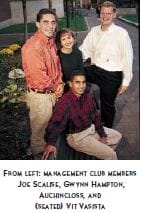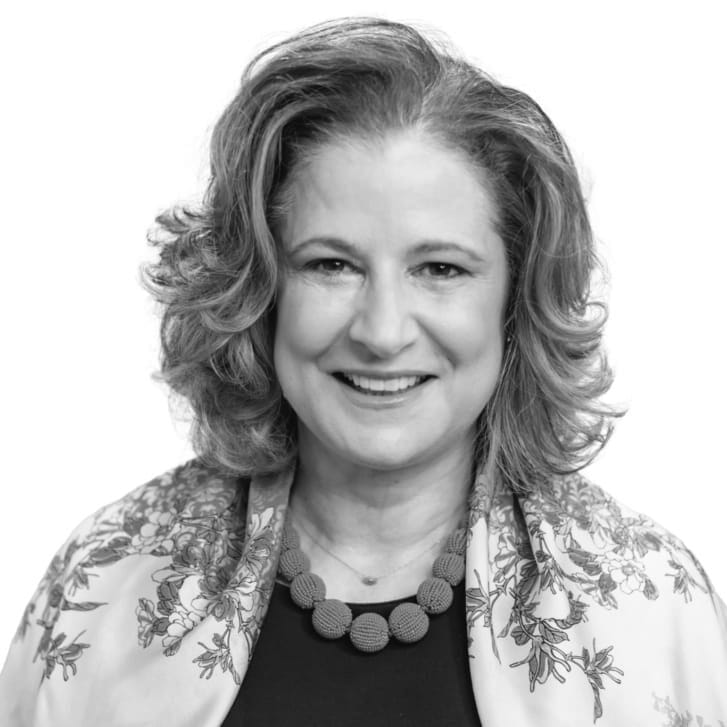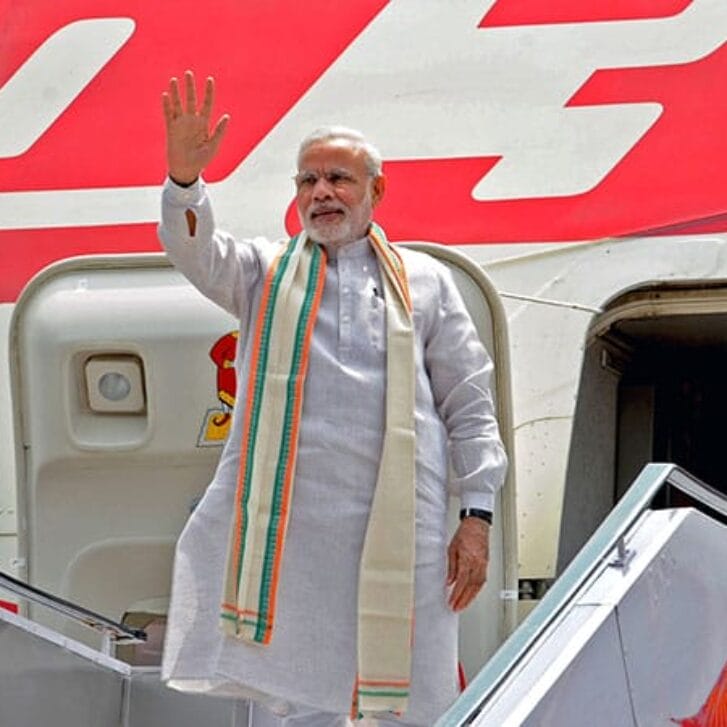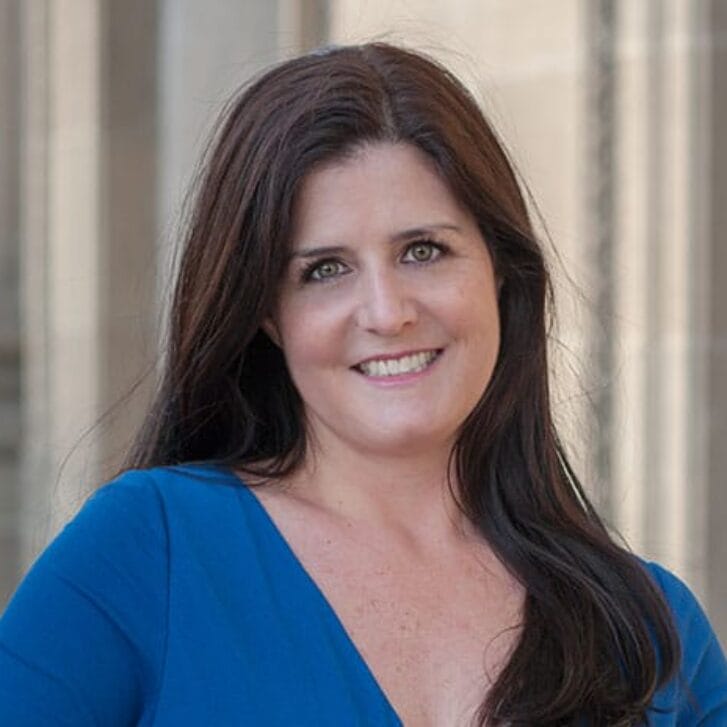Undergraduate Aims for Olympics
As the number one ranked fencer in the U.S. for men’s foil and the number one fencer on Penn’s team, sophomore Cliff Bayer, W’00, would seem to have his hands full. But clearly you don’t get to the top of this sport by standing still.
 Bayer traveled to fencing tournaments in Montreal, Cuba and Venezuela during the past three months and will attend competitions in Italy and Portugal this spring. That’s on top of practicing his sport every day on campus and every weekend at his hometown gym in New York City.
Bayer traveled to fencing tournaments in Montreal, Cuba and Venezuela during the past three months and will attend competitions in Italy and Portugal this spring. That’s on top of practicing his sport every day on campus and every weekend at his hometown gym in New York City.
“It’s not the kind of sport where you have a natural aptitude for it, like basketball,” says Bayer, who started fencing at age 9. “You really have to work hard on technical skills. It’s a lot of grunt work, a lot of drills … Some people call it chess with muscles. I don’t know how to play chess. But I know that you have to go into a match with a game plan. It’s very tactical.”
Bayer fences with a foil, which is a thinner sword than an epee or a saber. Fencers wear bulletproof kevlar material and are hooked up electronically to a machine that lights up when a fencer is hit. “Fencing is the second fastest sport in the Olympics, behind shooting,” says Bayer. “Sometimes two lights go off at the same time and it’s hard for a referee to tell who got hit first.”
Bayer participated in the world championships in Cape Town in July where he finished 40th, lower than he had hoped but higher than any other American. In August he represented Wharton at the World University games in Sicily, where he finished 15th. The U.S. team, which he captained, finished fifth — posting their best result so far and beating out teams from such traditional strongholds as France, Hungary and Austria.
“Goals are very important,” says Bayer, who interned last summer at Merrill Lynch. “I like to set high goals for myself, because the higher you set them the higher your results will be. If you set low goals you are not really going to push yourself.”
One of his goals is to participate in the Olympics in 2000 in Sydney. But before that, “I would like to find a job this summer in Milan and eventually major in international management. I have to realize there is life after fencing.”
A Banner Year for Job Seekers
Perhaps it’s the MBA equivalent of breaking the sound barrier. Wharton’s 1997 MBA class broke all previous records in number of jobs offered, number of jobs accepted and total median compensation.
According to the Career Development & Placement Office, 98 percent of the class received job offers and 97 percent accepted positions. Graduates received a median compensation package of $130,000, including a $75,000 starting base salary, a $20,000 signing bonus, a $25,000 guaranteed first-year bonus and other miscellaneous compensation worth $10,000.
The three most popular industries were consulting, the top employer with 30 percent of the class, followed by investment banking/brokerage, with 25 percent, and high-tech industries, with 6 percent and growing.
McKinsey & Co. hired the most graduates (49), followed by Goldman, Sachs & Co. (28), Bain & Co. (24), Morgan Stanley & Co. (24), A.T. Kearney, Inc. (23), Andersen Consulting Strategic Services (20), and Merrill Lynch (20).
In the last three years, Wharton has sent 246 students — 115 graduates and 131 interns — into high-tech positions. In 1997, graduates or interns joined such firms as Activision, Broderbund Software, AT&T Wireless, CDNow, Dell, Hewlett-Packard, Microsoft, Intel, Disney Interactive, Excite, Intuit, Netscape, Oracle, PowerAgent, Silicon Graphics, Sony Music Online, Silicon Valley Internet Partners and Sprint.
Job offers with international responsibility were accepted by 43 percent of the class, while 21 percent took positions abroad. Of the 31 countries where graduates accepted job offers, the most popular (excluding the U.S.) are the United Kingdom, Japan, South Korea, Hong Kong, Mexico, Singapore and Brazil.
Scholarship in Mother Teresa’s Name Benefits Indian Student – and India
When HOPE worldwide, an international philanthropic organization based in Wayne, Pa., presented its HOPE Unity Award last summer to Mother Teresa and her Calcutta-based Missionaries of Charity, Sambamurthy Natarajan, WG’99, had no idea that the award would relate in any way to his experience at Wharton.
The HOPE Unity Award included a two-year $50,000 scholarship for a Wharton MBA student from India who has demonstrated a commitment to returning home and helping his or her country’s most disadvantaged citizens. Natarajan, after interviewing with officials from HOPE worldwide, was awarded the scholarship in August.
 The 31-year-old finance major comes from Bhopal where he, his brother and his mother, who has a doctorate in education, started a private school called Vidya Mandir (Temple of Knowledge). The school provides an English education for approximately 800 students in grades K-8. “My family is not wealthy, but we had a vision that we wanted to leave a footprint in the sands of time,” says Natarajan, whose father is a senior officer in the Bhopal government. “All the money that the school makes is ploughed back into improvements.”
The 31-year-old finance major comes from Bhopal where he, his brother and his mother, who has a doctorate in education, started a private school called Vidya Mandir (Temple of Knowledge). The school provides an English education for approximately 800 students in grades K-8. “My family is not wealthy, but we had a vision that we wanted to leave a footprint in the sands of time,” says Natarajan, whose father is a senior officer in the Bhopal government. “All the money that the school makes is ploughed back into improvements.”
Natarajan, who continues to serve on the school’s board of directors, earned an engineering degree near New Delhi and eventually joined Citibank, first in Singapore and then in Mumbai, Chicago and New York.
At Wharton, he was asked during an interview with the directors of HOPE worldwide how he would use his Wharton education to help his native country.
“I took great care to explain that I am not a social scientist or sociologist but a businessman,” says Natarajan. “My intention is to go back to India in the next few years in the corporate world. As a successful career professional, I would hope to raise substantial funds from corporate sponsorships and well-off individuals and ultimately set up a non-governmental organization — to be run by professionals on a voluntary basis — that would channel experience, resources and ideas into activities for the poor.
“I am particularly interested in education and adoption. Adult education classes are needed to enable professional skill development, and basic literacy classes are needed for children. Adoption today is poorly organized, lacks marketing and communication and is full of barriers and stigmas. There are many homeless and there are many childless in India. There couldn’t be a more perfect ‘product’ opportunity with a social message.”
Before attending Wharton, Natarajan was a member of the National Service Scheme program in India and helped organize disaster relief for the Latur earthquake victims in 1993. He is also sponsoring a child under the CRY (Child Relief and You) foundation. His wife spent three years in Delhi in an organization founded by Mother Teresa that provides food to the poor. The couple has a seven-month-old daughter.
Natarajan “is a very impressive individual,” says Robert Alig, WG’87, director of graduate admissions at Wharton. “What’s especially wonderful about him is that he underscores much of what we look for in applicants to Wharton. He saw a problem — the lack of quality education — and went out and tried to address it. He showed both commitment and initiative.”
Other recipients of the HOPE Unity Award — which honors worldwide leaders who “have sacrificed personal liberties for the sake of uniting many in peace” — include Nelson Mandela and Jimmy and Rosalynn Carter.
Celebrating Achievement
 Beth Kaplan, W’80, WG’81, executive vice president, marketing, for Rite Aid Corp., received this year’s Kathleen McDonald Distinguished Alumna Award from Wharton Women in Business at the 18th Annual Wharton Women in Business Conference on Oct. 31 in Philadelphia.
Beth Kaplan, W’80, WG’81, executive vice president, marketing, for Rite Aid Corp., received this year’s Kathleen McDonald Distinguished Alumna Award from Wharton Women in Business at the 18th Annual Wharton Women in Business Conference on Oct. 31 in Philadelphia.
 The award was renamed this year to honor Kathleen McDonald, WG’79, a lifetime advocate for women who was the original founder of what is now the Graduate Women in Business club. McDonald was killed in a car accident in June 1988 while on a business trip in Lisbon, Portugal. At the time of her death she was manager of organization and development for the performance division of Exxon Enterprises. In the spring of 1988 she had received the Exxon President’s Award for Community Relations.
The award was renamed this year to honor Kathleen McDonald, WG’79, a lifetime advocate for women who was the original founder of what is now the Graduate Women in Business club. McDonald was killed in a car accident in June 1988 while on a business trip in Lisbon, Portugal. At the time of her death she was manager of organization and development for the performance division of Exxon Enterprises. In the spring of 1988 she had received the Exxon President’s Award for Community Relations.
At left, Cathy DuRei, WWIB president, shows the plaque with the names of award winners to McDonald’s father, Ambassador John W. McDonald, and her stepmother, Christel McDonald.
Alumnus Honored for Distinguished Service
Keisuke Muratsu, WG’75, president of Activity International, an advisory and investment firm based in Tokyo, received the 1997 Distinguished Service Award during a presentation in October.
 The DSA was established by the Wharton Alumni Association in 1988 to recognize exemplary volunteer contributions to the School.
The DSA was established by the Wharton Alumni Association in 1988 to recognize exemplary volunteer contributions to the School.
Muratsu has been a member of the School’s Asian Executive Board since its formation in 1988 and president of the Wharton Club of Japan since 1994. His volunteer activities have included fundraising, public relations and faculty research. In addition, he was one of the original supporters of the Faculty International Seminar in Japan, and has participated in all seven seminars held so far.
Muratsu joined Citibank after his graduation from Wharton, holding positions in a variety of locations around the word, including Riyadh, Saudi Arabia, and Athens, Greece. He subsequently formed Activity International, Inc. and is also president of two family-owned manufacturing businesses based in the Kobe-Osaka area.
Management Training Offered to Senior Executives in China
Under a landmark agreement with the People’s Republic of China, Wharton and Penn’s Graduate School of Education will provide management training for senior government officials and administrators in China.
The agreement was announced during PRC President Jiang Zemin’s visit to campus on Oct. 30.
The programs, developed at the request of the Chinese government, will enhance management skills of public officials and executives of state-owned enterprises who are working at the national, regional and local levels in China, as well as expose them to the principles of a market-driven economy.
“As the PRC continues to emerge as a significant force in the global economy, government administrators and executives will need to understand the dynamics of a competitive environment,” says Robert E. Mittelstaedt, Jr., vice dean and director of executive education at Wharton. “We are delighted to be selected by the Chinese government to create this first-of-its-kind educational initiative.”
The three programs to be taught this year include:
– The National School of Administration Senior Management Program — a two-week course targeting senior government officials and focusing on China’s transition to a competitive global economy.
– The Jiangsu Management Development Program — an intensive six to eight week management development experience at Wharton for provincial officials and senior executives.
– The Shanghai Executive Development Program — targeted to a broad market of managers and executives in state-owned enterprises and employees of multi-national corporations operating in China. Jiang Mian Heng, CEO of Shanghai Alliance Investment Ltd., will be Wharton’s partner in Shanghai.
Wharton has close to 500 alumni in Greater China, and 107 students from this area are currently enrolled in MBA and undergraduate programs.
Speaking From Experience
For many students, it was an opportunity for a behind-the-scenes look at some of the most successful companies in today’s marketplace.
Under the auspices of the Zweig Executive Lecture Series, the Musser-Schoemaker Lecture Series, the Lauder Institute, the Gruss Public Policy Forum and other sponsors, top executives were invited to Wharton to meet with undergraduate and MBA students and share their perspectives on market trends, risk-taking, innovation, personal values and the importance of relationships, among other topics.
Speakers on campus last fall included:
– Rebecca Mark, CEO, Enron International
– Douglas A. “Sandy” Warner, Chairman, J.P. Morgan
– Anil Ambani, WG’82, Managing Director, Reliance Industries
– Ken Moelis, W’81, WG’81, Managing Director and CEO, Donaldson, Lufkin & Jenrette
– Shijuro Ogata, Senior Adviser, Yamaichi Securities
– Michael Dell, Chairman and CEO, Dell Computer Corp.
– Gilbert F. Casellas, Chairman, U.S. Equal Employment Opportunity Commission
– Lawrence Bossidy, Chairman and CEO, Allied Signal
– Clark Johnson, Chairman and CEO, Pier 1 Imports
Consulting By the Book
Two case scenarios:
– A European manufacturing company faces a declining return on net assets and has asked you as a consultant to come in and bail them out. What would you do?
– A big consulting company has come to campus looking for new recruits and you desperately want to get hired in their Paris office (or any other office). What would you do?
 The answer to the second question is easy: Get hold of a new book edited by Will Auchincloss, WG’98, and Tom Kibarian, WG’97, titled The 1997-98 Wharton MBA Consulting Club Case Interview Study Guide.
The answer to the second question is easy: Get hold of a new book edited by Will Auchincloss, WG’98, and Tom Kibarian, WG’97, titled The 1997-98 Wharton MBA Consulting Club Case Interview Study Guide.
For their material, the authors used actual case studies — like the example above about the European manufacturing company — from second-year students’ interviews with consulting companies. The interviews were written up by Auchincloss, members of Wharton’s management consulting club, and a number of students involved in the Christmas in April program. Proceeds from the original on-campus version of the book went to help the Christmas in April program.
“The book offers an opportunity to practice before the actual interview,” says Auchincloss, who worked for Mercer Management over the summer. “And the consulting companies don’t have a problem with it as long as we don’t identify which case came from which firm.” The project was spearheaded last year by Kibarian, who is now a consultant for McKinsey & Co. in Chicago.
The book is available at a cost of $15 from WetFeet Press, a small publishing company in San Francisco that distributes its products over the Internet.
What’s in it for the authors and for Wharton? “The School gets royalties and enhanced prestige,” says Auchincloss, “and the consulting club, which helped compile the cases, gets a little money to help cover expenses. Besides that, we had fun doing it. We think it will be a popular book.”
Campus News
– Fifteen Wharton faculty will participate in a weekly series on “Mastering Marketing” to appear in the Financial Times starting this spring. Other schools contributing articles to the series include Kellogg, INSEAD and the London School of Business.
– Tom Siebel, CEO of Siebel Systems, Inc. in San Mateo, Ca., keynoted the 29th annual Seminar for Business Writers held Dec. 14-18 in Philadelphia. Siebel Systems is the world’s leading provider of enterprise-class sales, marketing and customer service systems.
The 45 participants in the December seminar included journalists from the New York Times, Fortune, Washington Post, CNN, Money, Business Week, U.S. News & World Report, Computerworld, Reuters and La Prensa, among other organizations.
– “Renaissance: Delivering the Tools for a New Era” was the theme of the 24th annual Whitney M. Young, Jr. Memorial Conference held Jan. 15-18 at the Philadelphia Convention Center. The conference was sponsored by Wharton’s African American MBA Association.
Keynote speakers included Ernest Green, managing director, Lehman Brothers, and member of the “Little Rock Nine;” Harriet Michel, president of the National Minority Supplier Development Council, and The Hon. Festus Mogae, acting president of Botswana.
– Impact conferences scheduled for this spring on campus include: “Managing Clinical Performances: Creating Competitive Advantage,” sponsored by the Health Care Systems Department on March 9-10; “Retirement Needs and Resources,” sponsored by the Pension Research Council on April 27 and 28; and “Ethical Issues in Financial Services,” sponsored by the Zicklin Center for Business Ethics Research on May 29.


























